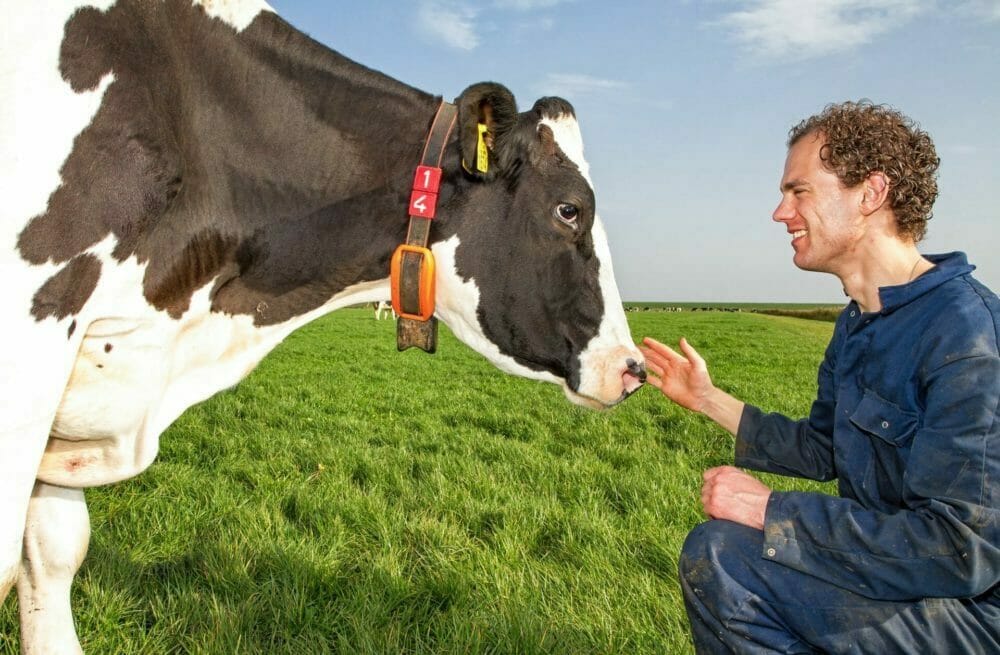Editor’s Note: Connecterra is an AgFunder portfolio company. AgFunder invested in Connecterra’s $4.9 million Series A in 2018, with AgFunder’s Michael Dean penning a thought piece via AFN last November on Connecterra’s journey from its initial sensor focus as a ‘fitbit for cows,’ to a full-stack technology and artificial intelligence platform combining proprietary sensor hardware, animal data, third party enterprise data, and machine learning algorithms.
The Dutch dairy AI platform Connecterra has closed its Series B funding round at €7.8 million ($8.8 million), a tally that marks the largest ever Series B investment secured by a European livestock tech company — though only if insects are not classified as livestock.
New investors in this Amsterdam-based firm are London’s ADM Capital, the French food safety company Kersia, and a Dutch impact investor syndicate called the Put Your Money Where Your Meaning Is Community (Pymwymic, for short). Existing investors like the IoT specialists Breed Reply and Russia’s SistemaVC also joined the round.
For the investors in this round, most of the ruminating over why to cut cheques at a time of pandemic relates to calls for greater efficiency and sustainability in the global dairy industry. Without question, the dairy sector is thirsty for this. Dairy producers have been battered in recent years by milk price slumps, trade disputes, and rising costs — all alongside pressures from regulators, retailers and consumers to boost animal welfare and pare back the use of antibiotics and vaccines. The disastrous supply chain tumult with the onset of the coronavirus pandemic — which saw vast sums of milk tossed into the gutter while a growing splurge of competition from plant based milk alternatives cropped up on supermarket shelves — has only cranked up the innovation pressure.
In a joint press release this week bringing the deal into the open, Alistair Cooper of ADM Capital highlighted Connecterra’s “sensors and cutting-edge artificial intelligence,” believing this will “empower farmers via predictive intelligence to drive productivity and increase sustainability.” Kersia CEO Sébastien Bossard, meanwhile, saw his firm’s funds as a strategic result of a worldwide survey of AI for agtech, which led to identifying Connecterra as “a promising digital partner.” Sensing a chance for impact was Rogier Pieterse of Pymwymic, who hoped his firm’s new portfolio company will “contribute to the transition of this traditional industry by reducing its negative footprint, supporting smallholder farmers in developing countries and accelerating regenerative practices.”
That last point of regenerative agriculture is pertinent even for dairy giants like Danone; the French multinational has been expressing a willingness to transition to more regenerative methods of farming, but has a hard time defining and measuring progress — a common critique of regenerative agriculture. It is one reason Connecterra has seen adoption of the Ida platform by industry giants such as Danone, Bayer and food safety expert Kersia. The technology is being used to create sustainable farming models that have eliminated the use of hormones, reduced antibiotic usage by up to 50%, and increased farm efficiency. The platform is also part of the Farming for Generations (F4G) consortium led by Danone, aimed at implementing regenerative agriculture practices.
Find out more about Connecterra’s work with Danone in this special video version of our Future Food podcast here.
The latest funding will equip Connecterra with the funding needed to grow its presence in dairy leading regions such as Europe, North America and New Zealand and further scale-out and develop the AI models and technology behind its platform, which is known as Ida. But that funding did not come easy. In a phone call with AFN, Connecterra CEO Yasir Khokhar described the last few months as “a bumpy ride” — both for his company trying to fundraise during a pandemic, and for the dairy sector more generally. “A number of investors just bumped the brakes; new investors were out the door,” he recalled. In recent weeks, though, he has noted signs of investors starting to resume activity in the new normal. For the industry, initial losses from the closure of restaurants were in part offset by strong retail demand for dairy premium proteins, he added. And on an optimistic note for his company, the initial shock of adjusting production, he said, was making farmers more aware of the need to rapidly digitise farm management. “Farmers have typically made these decisions by experience but not with data,” he said, and more precise decisions could come from the crunching of more data streams (such as the one added in February by the robotics company Lely, which has agreed to sharing information from T4C, one of its farm management software products)
A virtual village
There are also advantages to platforms like this in an era of remote working and social distancing. “It takes a village to run a farm. You have nutritionists, breeders, vets,” Khokhar said. “They can’t visit the way they used to. So how do you connect the advisors to enable digital collaboration?” While the company was not directly focused on televeterinary practice or traceability plays, Khokhar said his company was open to enabling and encouraging that for third parties. In particular, the firm is interested in identifying data-driven ways toward best practice.
“Looking at models as to how and what practices on a farm lead to a lower carbon footprint…That’s smack bang in the middle of what we’re working on.”
Got a dairy tech tip? Email [email protected]





